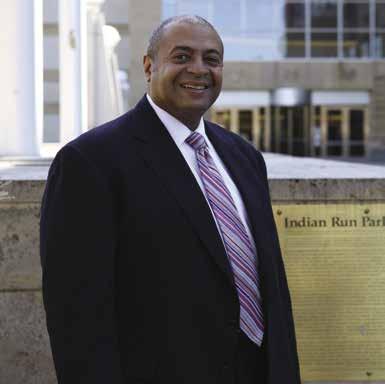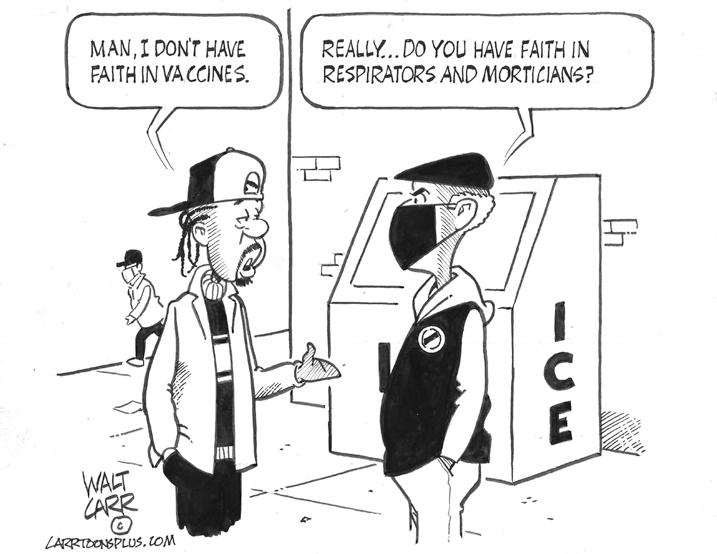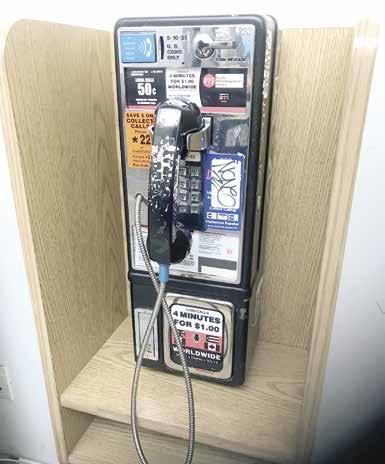BUSINESS The Rise and Fall of an American Essential – The Neighborhood Payphone Stacy M. Brown WI Senior Writer
Remember when? Regardless of whether you are a Baby Boomer, Millennial, or Generation X, it’s a question that often comes to the forefront. However, there’s one “remember when” question that will probably stump even the most the progressive Generation Z crowd: Whatever happened to America’s many public payphones and phone booths? Wait. What? For at least a century, a payphone was as crucial as a mailbox. And while coin-operated public telephone first cost five cents before rising to one dime, then a quarter, 35 cents and even 50 cents, few people complained –
at least not loudly. At least you never had to worry about answering a call while driving. When the beeper or pager alerted the holder that someone needed to reach them, the neighborhood phone booth would be the next stop. (Beepers, or pagers, are now as outdated as the payphone). And, like beepers and pagers, virtually no one uses the payphone anymore. A recent Pew Research Center report noted that about 96 percent of Americans own cell phones. But like most out-of-date technology, there are still a few payphones around. “As someone who is, shall we say, more mature, my memory isn’t as good as it was,” offered entrepre-
JAMES G. DAVIS CONSTRUCTION CORPORATION (DAVIS) BID OPPORTUNITY James G. Davis Construction Corporation (DAVIS) is seeking qualified Small Business Enterprises (SBE) / Certified Business Enterprises (CBE) contractors for their participation in the St. Elizabeth’s Parcel 17 (1200 Sycamore Drive, SE) project. At this time, we seek qualified bidders in Divisions 03, 05, 07, 09, 14, 21, 22, 23, 26, 28, 31, 32, and 33. Please contact Kelly Mullins at kmullins@davisconstruction.com for project details. Documents will be available March 24, 2021. Bids for this project are due by 2:00 pm on Tuesday, April 21, 2021. All interested bidders please contact DAVIS Construction Attn: Kelly Mullins 12530 Parklawn Drive Rockville, MD 20852 Phone: 202-815-9946 Fax: 301-468-3918
14 APRIL 1 - 7, 2021
neur Sally Gibson. “Plus, I’m not wonderful with technology.” But recently she found it necessary to track down a payphone and the search was on. “I had gone out to do some shopping but forgotten to take my phone with me. I realized after shopping I had too much to walk home with so I was going to phone for a taxi. Realizing I didn’t have my phone with me, the only other option I could see was using a phone booth for the first time in years.” John Stevenson, a marketing specialist, said a payphone recently saved his day. “I was driving to meet a client when I forgot my mobile phone in the office,” he said. “Fortunately, we still have phone booths on a few streets nearby. I called my subordinate about my concern and saved the time I would have lost going back home. It might be out of style but there are still people who rely on these phone booths.” According to the U.S. Federal Communications Commission, roughly 100,000 payphones remain in the U.S. – down from 2 million in 1999. While the majority of phones are in New York, the District still has a few public booths in operation including at the Capital One Arena and outside of a few hotels like the Comfort Inn on H Street, NW, Dupont Plaza Hotel on New Hampshire Avenue, NW and the Days Inn on Connecticut Avenue, NW. Other than the advent of cellphones, what else caused the demise of public payphones? A 2017 report in The Atlantic said a “particularly intense lobby for a payphone ban emerged in Chicago in 1992. Concerned about a rise in drug trafficking, communities urged lawmakers to get rid of payphones across the city.
5 Once upon a time, pay phones were a staple on almost every street corner. After searching high and low, a pay phone was located during a drive on I-95. (DR Barnes/ The Washington Informer)
Fast forward – from 2000 to 2006, the number of cellphones in the U.S. rose from 90.6 million to 217.4 million. In the District in 2011, Metro announced the elimination of most of the 1,074 payphones in its train stations. But one caveat cannot be overlooked: Metro once had a lucrative contract with Verizon who provided service for all the phone booths in Metro’s many train stations. Then, total revenue generated from the phones began a steep and steady decline. In 2009, Metro officials said payphones were losing hundreds of thousands of dollars while the average use declined to about once a day.
TWO RIVERS PUBLIC CHARTER SCHOOL REQUEST FOR PROPOSALS General Contractor Two Rivers PCS is soliciting price quotes from licensed general contractors to renovate existing spaces in school facilities. To request a copy of the RFP, email Gail Williams at procurement@tworiverspcs.org. Proposals are due by April 22, 2021.
The remaining payphones had become a relic, and to some, something of a prop. The Jerusalem Post cited Julia Casciotti, a 17-year-old senior at Washington-Lee High School who crammed into a phone booth along with a few girlfriends for photoshoots after sleepovers. Over the years, Casciotti also made pretend calls, “pushing all the buttons and calling the operator.” “It’s always just been there,” she said while noting that she’s never actually used the payphone or seen anyone use it either. But Daniel Leblanc, 22, has seen people drop their coins into the payphone slot and said it freaked him out. An intern on Capitol Hill who lives in an apartment nearby, he walks by a phone booth on his way to and from the Metro. Leblanc uses a cellphone and doesn’t have a landline at home like many young people today. “The couple times I’ve seen people using it, I’ve thought, ‘That is really strange,’ “Leblanc told the newspaper. “Frankly, I wondered, ‘Don’t those people have cellphones?’” WI @StacyBrownMedia
THE WASHINGTON INFORMER / WWW.WASHINGTONINFORMER.COM







